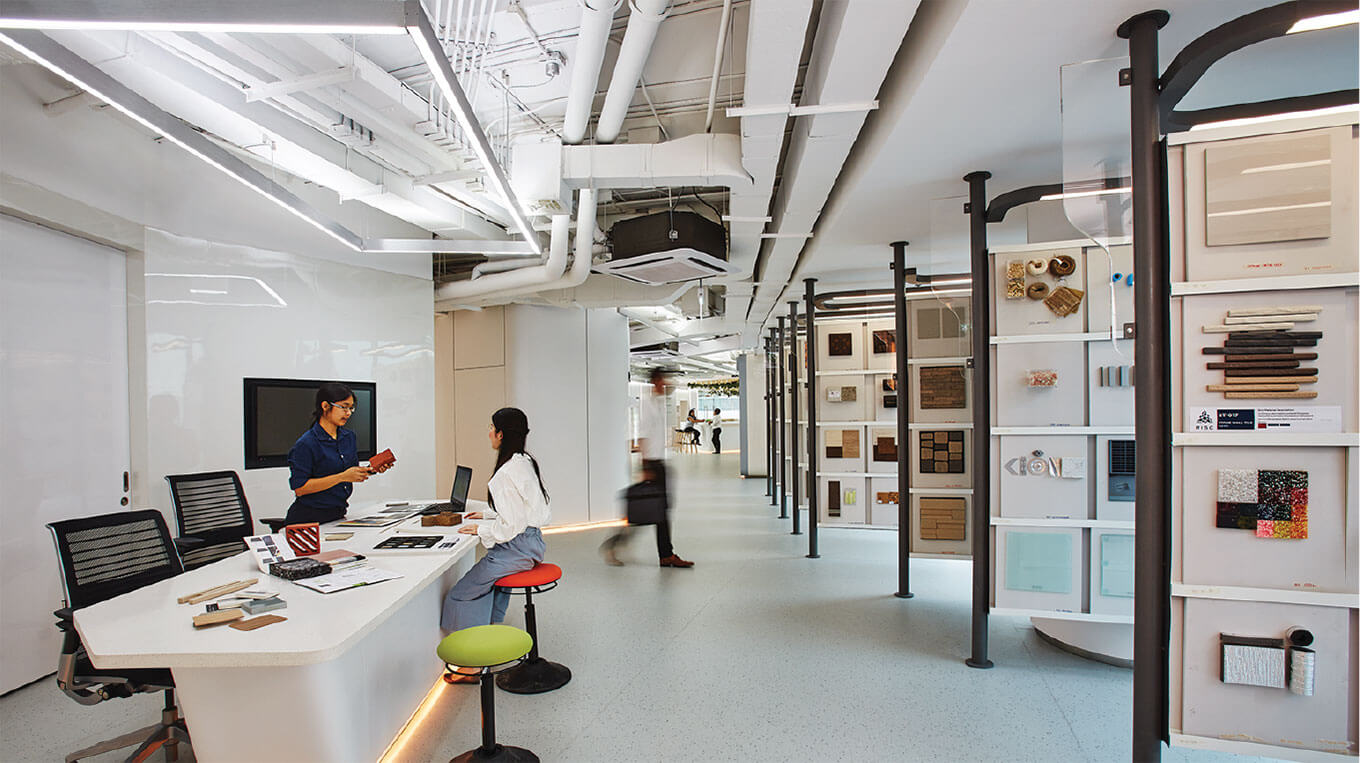
ห้องสมุด Well-being Material
เราเป็นนักวิจัยของ RISC ที่เน้นการค้นหาวัสดุที่มีคุณสมบัติที่ดีที่สุดสำหรับการนำมาประยุกต์ในโครงการสร้าง เพื่อคุณภาพชีวิตที่ดี ตามแนวคิดหลักของเรา “For All Well-Being”
ด้วยการขยายเครือข่ายด้านการวิจัยของเราและการสร้างพันธมิตรกับผู้ผลิตและนักออกแบบผลิตภัณฑ์เพื่อสิ่งแวดล้อม ห้องสมุดนี้จะเติบโตอย่างก้าวกระโดดและกลายเป็นหนึ่งในแหล่งสะสมวัสดุที่เป็นมิตรต่อสิ่งแวดล้อมที่มีความครอบคลุมมากที่สุดในปัจจุบัน

พื้นที่จัดแสดงวัสดุ
เป็นห้องสมุดแห่งแรก ที่รวบรวม และจัดแสดงวัสดุเกี่ยวกับการออกแบบ ตกแต่งอาคาร ที่เป็นมิตรต่อสิ่งแวดล้อม รองรับนักออกแบบที่ต้องการค้นคว้าหาข้อมูล และจะมีการอัพเดตวัสดุใหม่ตามกระแส

สตูดิโอวัสดุ
สตูดิโอเวิร์คช็อปวัสดุเป็นพื้นที่รองรับวัสดุใหม่ๆ ที่จะนำเข้ามาในห้องสมุดเพื่อเตรียมจัดแสดง ซึ่งประกอบไปด้วย สตูดิโอถ่ายภาพ และที่จัดเก็บเพื่อเก็บวัสดุ ก่อนที่จะถูกนำไปจัดแสดงในส่วนต่างๆ ใน RISC ต่อไป อีกทั้งยังเป็นสตูดิโอที่สามารถร่วมกันทำเวิร์คช็อปเพื่อแลกเปลี่ยนไอเดียและข้อมูลได้

ฐานข้อมูลวัสดุออนไลน์
วัสดุทุกชิ้นจะมีการเก็บรวบรวมข้อมูลเข้าฐานข้อมูลออนไลน์ โดยสามารถค้นหาข้อมูลได้เพื่อให้สะดวกในการทำงานมากขึ้น และในอนาคตจะเป็นฐานข้อมูลวัสดุที่ครบถ้วนสมบูรณ์ที่สุด
Find your favorite materials
คลังความรู้เรื่องวัสดุ
Sustainnovation กับบทบาทในการขับเคลื่อนสุขภาวะอย่างยั่งยืน
ปัจจุบัน โลกเราต้องเจอกับปัญหาต่างๆ มากมาย ไม่ว่าจะเป็นวิกฤตสิ่งแวดล้อม ปัญหาสุขภาพของประชากร ความเหลื่อมล้ำทางสังคม และความไม่แน่นอนทางเศรษฐกิจ เพียงแค่การพัฒนาที่มุ่งเน้นเพียงการเติบโตทางเศรษฐกิจไม่อาจตอบโจทย์ได้อย่างเพียงพออีกต่อไปแนวคิด Sustainnovation จึงเกิดขึ้นมา โดยเป็นการผสานกันของ Sustainability กับ Innovation เพื่อสร้างการเปลี่ยนแปลงเชิงบวกอย่างเป็นระบบและต่อเนื่องในระยะยาว Sustainnovation จะช่วยขยายขอบเขตของนวัตกรรมให้กว้างขึ้นด้วยการเพิ่มมิติของ "ความยั่งยืน" เข้าไป หรือก็คือนวัตกรรมต้องสามารถสร้างคุณค่าที่สมดุลระหว่างมนุษย์ สังคม และสิ่งแวดล้อมไปพร้อมกัน แนวคิดนี้จึงไม่ได้เริ่มต้นจากเทคโนโลยีเป็นศูนย์กลาง แต่เริ่มจากความเข้าใจในความต้องการที่แท้จริงของมนุษย์และข้อจำกัดของสิ่งแวดล้อม ก่อนนำองค์ความรู้ด้านการออกแบบทางวิศวกรรม เทคโนโลยี และสังคมศาสตร์มาประยุกต์ใช้ร่วมกันหนึ่งในประเด็นสำคัญที่มีบทบาทอย่างชัดเจนในการขับเคลื่อนการพัฒนาอย่างยั่งยืน คือ การสนับสนุนความเป็นอยู่ที่ดี (Well-Being) การสร้างสมดุลระหว่างสิ่งมีชีวิตและสิ่งแวดล้อม ซึ่งไม่ได้จำกัดอยู่เพียงการปราศจากโรคภัยไข้เจ็บเท่านั้น แต่ยังครอบคลุมถึงสุขภาพกาย สุขภาพจิตใจ ความปลอดภัย และความสบายของทุกชีวิตและสิ่งแวดล้อมโดยรอบ แนวคิด Sustainnovation จึงเข้ามามีบทบาทสำคัญในการพัฒนานวัตกรรมที่ตอบโจทย์ Well-Being อย่างเป็นระบบ โดยสามารถพบการประยุกต์ใช้นวัตกรรมเหล่านี้ได้ในหลากหลายระดับ ตั้งแต่ระดับบุคคล อาคาร ไปจนถึงระดับเมืองตัวอย่างนวัตกรรมที่ทาง RISC ได้คิดค้นและพัฒนาขึ้นมา มีตั้งแต่...ระดับบุคคล (Individual Scale): การศึกษาปัจจัยและตัวแปรที่ส่งผลต่อสุขภาพกายและจิตใจ อย่างเช่น...• ระบบเติมอากาศสะอาดสร้างความดันบวก (Positive fresh air unit) สำหรับห้องพัก ช่วยให้อากาศภายในห้องสะอาด ลดการสะสมของ CO2 ฝุ่น กลิ่นอับ และการปนเปื้อนจากภายนอกได้• เครื่องลดความชื้นและกลิ่นอับในห้องน้ำ (Humi-dryer) สามารถติดตั้งในตำแหน่งราวแขวนผ้าในห้องน้ำเดิม เพื่อทำให้พื้นแห้ง ลดการสะสมความชื้น และลดโอกาสการเกิดเชื้อรา• เทคโนโลยีฆ่าเชื้อโรคจากผิวพัสดุและบรรจุภัณฑ์ (Dee box) พัฒนาขึ้นในช่วงสถานการณ์การแพร่ระบาดของ COVID-19 โดยเพิ่มความปลอดภัยกับสิ่งของที่เราสั่งเข้ามา และช่วยลดความเสี่ยงด้านสุขภาพในบริบทของสังคมยุคใหม่• ระบบตรวจจับและวิเคราะห์อารมณ์ผ่านการแสดงออกทางสีหน้า (Facial Emotion Recognition) โดยใช้เทคโนโลยีปัญญาประดิษฐ์ (AI) ที่สามารถประเมินและติดตามสภาวะอารมณ์ของคนไทยผ่านการประมวลผลภาพจากกล้อง เพื่อเฝ้าระวังสุขภาพจิตระดับอาคาร (Building Scale): มุ่งเน้นการสร้างสภาพแวดล้อมที่เอื้อต่อสุขภาวะของผู้ใช้งานอย่างรอบด้าน อย่างเช่น...• ประตูระบายอากาศ (Ventilation door) การพัฒนาองค์ประกอบอาคารที่ช่วยส่งเสริมการระบายอากาศ ผ่านการออกแบบประตูที่สามารถถ่ายเทอากาศได้ เพื่อลดการสะสมความชื้น กลิ่นอับ และเพิ่มความรู้สึกสบายให้กับผู้ใช้งานในอาคาร• การเพิ่มมูลค่าขยะพลาสติก (Upcycled Plastic) การพัฒนาวัสดุก่อสร้างที่คำนึงถึงวงจรชีวิตของทรัพยากรเป็นองค์ประกอบอาคารอย่างพื้นถนน ทางเดินเท้า และขอบทางเดินเท้า รวมถึงการตกแต่งภายในอาคาร อย่างพรม• ระบบการจัดการอาคารอัจฉริยะ (Intelligent building) ที่เป็นมากกว่าการประหยัดพลังงาน แต่เน้นไปที่ความเหมาะสมต่อสุขภาพ และความรู้สึกสบายของคนในอาคาร โดยระบบถูกออกแบบให้ใช้พลังงานเท่าที่จำเป็นผ่านการทำงานร่วมกันของเซนเซอร์ชี้วัดด้านสุขภาพและระบบระบายอากาศอย่างมีประสิทธิภาพระดับเมือง (Urban Scale): มุ่งเน้นการสร้างพื้นที่ปลอดภัยในระดับเมืองผ่านนวัตกรรม อย่างเช่น...• หอฟอกอากาศในระดับเมือง (Fahsai) ที่ช่วยกรองปริมาณฝุ่นขนาดเล็กในอากาศ ลดความเสี่ยงด้านสุขภาพจากฝุ่นให้กับพื้นที่เมือง สร้างพื้นที่ปลอดภัยให้คนเมืองได้ออกมาใช้พื้นที่ภายนอก• พื้นที่สีเขียวเชิงฟื้นฟูระบบนิเวศ (Urban Ecology) ซึ่งช่วยรักษาสมดุลของสภาพแวดล้อมในเมือง ลดความร้อนสะสมของเมือง และยังช่วยเพิ่มพื้นที่สีเขียว เปิดโอกาสให้คนเมืองเข้าถึง ส่งผลโดยตรงต่อสุขภาพกาย ลดความเสี่ยงด้านสุขภาพใจ พร้อมทั้งสร้างสภาพแวดล้อมเมืองที่เอื้อต่อสุขภาวะที่ดีในระยะยาวSustainnovation นี้มีบทบาทสำคัญต่อการพัฒนาอสังหาริมทรัพย์ของ MQDC ที่สะท้อนบทบาทของนักพัฒนาอสังหาริมทรัพย์ในมิติใหม่ ที่ไม่ได้มองตนเองเป็นเพียงผู้ใช้ทรัพยากร หรือผู้ก่อสร้างทางกายภาพ แต่เป็นการตระหนักว่านักพัฒนาอสังหาริมทรัพย์เป็นผู้สร้างคุณค่าและความยั่งยืนให้กับเมืองและสังคม ซึ่งที่ผ่านมา MQDC ตั้งใจผสานแนวคิดของ Sustainnovation เข้าไปในทุกขั้นตอนของการพัฒนา ตั้งแต่การวางผัง การออกแบบ การเลือกใช้เทคโนโลยีและวัสดุ ไปจนถึงการบริหารจัดการในระยะยาว แนวทางดังกล่าวจะสะท้อนมุมมอง การพัฒนาอสังหาริมทรัพย์สามารถเป็นกลไกสำคัญในการฟื้นฟูคุณภาพชีวิต สร้างระบบนิเวศเมืองที่เอื้อต่อสุขภาวะของผู้คนและสิ่งแวดล้อม และวางรากฐานให้เมืองเติบโตอย่างสมดุลในระยะยาว มากกว่าการสร้างผลกระทบเชิงลบต่อทรัพยากรธรรมชาติ หรือชุมชนโดยรอบSustainnovation ถือเป็นกรอบการพัฒนาที่สะท้อนการเปลี่ยนผ่านของโลกยุคใหม่ จากการเน้นประสิทธิภาพระยะสั้น ไปสู่การสร้างคุณค่าอย่างยั่งยืนในระยะยาว โดยมี Well-Being ของมนุษย์และความสมดุลของสิ่งแวดล้อมเป็นเป้าหมายหลัก การพัฒนานวัตกรรมภายใต้กรอบคิดนี้จึงไม่ได้ตอบโจทย์ปัจจุบัน แต่ยังวางรากฐานให้สังคมและโลก ให้สามารถดำรงอยู่ได้อย่างมั่นคง และมีคุณภาพในอนาคตเนื้อหาโดย คุณ ณพล เกียรติก้องมณี สถาปนิกวิจัยอาวุโส แล Building Technology, Intelligent Systems, Innovative Solutions
สำหรับสมาชิก
สำหรับผู้ผลิต
ลงชื่อเข้าเป็นสมาชิกฟรี เพื่อรับสิทธิ์ในการใช้สิ่งอำนวยความสะดวกต่างๆ รวมทั้งห้องสมุดวัสดุที่เป็นมิตรต่อสิ่งแวดล้อม

